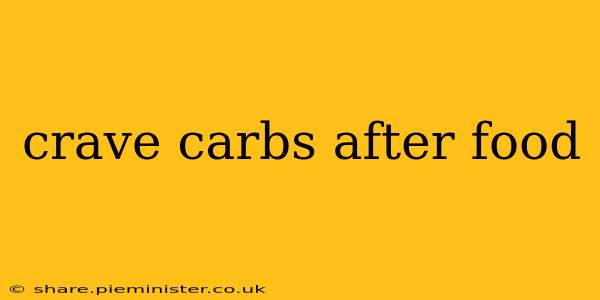Do you find yourself intensely craving carbohydrates even after you've just finished a meal? You're not alone. Many people experience this frustrating and sometimes confusing phenomenon. This craving isn't just about willpower; it's a complex interplay of several physiological and psychological factors. This article delves into the science behind carbohydrate cravings post-meal, offering insights and strategies to help you manage them.
Why Do I Crave Carbs After Eating?
This is a question many people ask, and the answer isn't always straightforward. Several factors can contribute to post-meal carbohydrate cravings:
-
Blood Sugar Spikes and Crashes: Consuming foods high in refined carbohydrates or sugars can lead to a rapid spike in blood sugar, followed by a sharp drop. This rollercoaster effect can trigger cravings, as your body seeks to restore its energy balance. The initial surge leaves you feeling temporarily satisfied, but the subsequent crash makes you crave more carbohydrates to quickly replenish your energy levels.
-
Nutrient Deficiencies: Sometimes, a craving for carbohydrates signals a lack of essential nutrients. Your body might be trying to compensate for deficiencies in things like chromium (which helps regulate blood sugar) or magnesium (crucial for energy production).
-
Hormonal Fluctuations: Hormones play a significant role in appetite regulation. Fluctuations in insulin, cortisol (a stress hormone), and leptin (a hormone that signals satiety) can influence carbohydrate cravings.
-
Gut Health: An imbalance in your gut microbiome can impact your metabolism and contribute to food cravings, including carbohydrates. Certain gut bacteria may even produce substances that influence your brain's reward centers, making you crave specific foods.
-
Psychological Factors: Stress, anxiety, boredom, and even emotional eating can trigger cravings for comfort foods, and carbohydrates often fall into this category. They provide a sense of comfort and reward, offering temporary relief from negative emotions.
-
Fiber Intake: A diet lacking in fiber can contribute to blood sugar instability and increase carbohydrate cravings. Fiber slows down digestion and prevents rapid blood sugar spikes.
What Foods Might Be Contributing to My Cravings?
Identifying the foods that trigger your cravings is crucial. This often involves paying close attention to what you eat and how you feel afterward. Highly processed foods, sugary drinks, and refined carbohydrates (like white bread and pastries) are notorious for causing blood sugar fluctuations, leading to cravings.
How Can I Reduce Carb Cravings After Meals?
Managing post-meal carbohydrate cravings involves a multi-pronged approach:
-
Prioritize Whole, Unprocessed Foods: Focus on meals and snacks that are rich in whole grains, lean proteins, healthy fats, and fiber. These foods provide sustained energy and help stabilize blood sugar levels.
-
Control Portion Sizes: Eating excessively, even of healthy foods, can still lead to blood sugar fluctuations. Pay attention to your body's hunger and fullness cues.
-
Stay Hydrated: Sometimes, thirst can be mistaken for hunger, leading to unnecessary snacking.
-
Manage Stress: Stress reduction techniques such as meditation, yoga, or deep breathing exercises can help minimize stress-induced eating.
-
Get Enough Sleep: Lack of sleep disrupts hormone regulation, potentially increasing cravings.
-
Consider a Food Diary: Tracking your food intake and noting any cravings can help you identify patterns and triggers.
-
Consult a Healthcare Professional or Registered Dietitian: For persistent or severe carbohydrate cravings, it's essential to consult a healthcare professional to rule out any underlying medical conditions or nutrient deficiencies.
Are There Certain Supplements That Can Help?
While supplements aren't a replacement for a balanced diet and lifestyle, some may support blood sugar regulation. However, it's crucial to consult with a healthcare professional before taking any supplements, as they can interact with medications or have potential side effects.
Could My Cravings Be a Sign of a Medical Condition?
While post-meal carbohydrate cravings are often related to diet and lifestyle, they can sometimes indicate underlying medical conditions like insulin resistance, hypoglycemia, or other metabolic disorders. If your cravings are severe, persistent, and accompanied by other symptoms, seeking medical advice is essential.
By understanding the root causes of your carbohydrate cravings and implementing the strategies outlined above, you can gain more control over your appetite and enjoy a healthier relationship with food. Remember, consistency is key—making sustainable changes to your diet and lifestyle will yield the best long-term results.
